
Watch Dr. Veda N. Giri, Dr. Umang Swami and Sue Friedman answer questions about genetics and genomics during the CURE Educated Patient Prostate Cancer Summit.

Watch Dr. Veda N. Giri, Dr. Umang Swami and Sue Friedman answer questions about genetics and genomics during the CURE Educated Patient Prostate Cancer Summit.

Watch Dr. Umang Swami, from Huntsman Cancer Institute, discuss genomic changes and PARP inhibitors, during the CURE Educated Patient Prostate Cancer Summit.
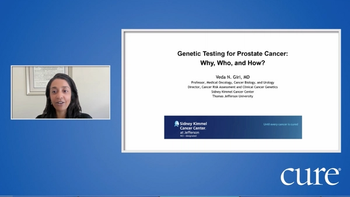
Watch Dr. Veda N. Giri, from Sidney Kimmel Cancer Center at Thomas Jefferson University, discuss genetic testing and who should get it, during the CURE Educated Patient Prostate Cancer Summit.

Brukinsa, which was approved in September 2021, resulted in better ouctomes for certain patients with with Waldenström macroglobulinemia, according to the ASPEN clinical trial.

Patients who underwent Revlimid, Velcade, and dexamethasone therapy followed by maintenance Revlimid, tended to have better outcomes when they underwent autologous stem cell transplant.

Watch Dr. Ganesh Raj, Dr. Andrew Z. Wang, and Bruce Williams, discuss treatment for localized disease, during the CURE Educated Patient Prostate Cancer Summit.

The use of Jakafi plus chemotherapy shows promise in the pre- and post-surgical treatment settings for patients with stage 3 and 4 ovarian cancer, warranting further study of the combination.

Keytruda, an immunotherapy agent, demonstrated significant improvement in both distant metastasis-free survival and recurrence-free survival compared to placebo.
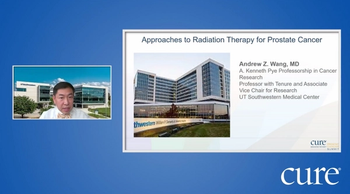
Watch Dr. Andrew Z. Wang, from UT Southwestern Medical Center, discuss approaches to radiation for local disease, during the CURE Educated Patient Prostate Cancer Summit.

After more than two years of follow-up, patients with previously untreated, locally advanced stage 3 non–small cell lung cancer continue to derive a benefit from treatment with Keytruda and chemoradiation.

One-hundred percent of patients with stage 2/3 mismatch repair-deficient rectal cancer had their disease disappear after treatment with Jermperli, though more research and longer follow-up is needed.
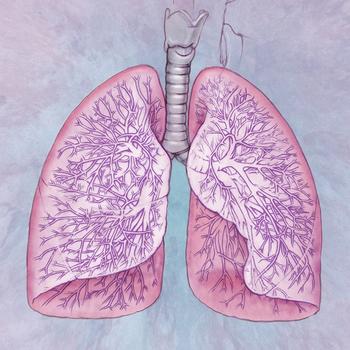
Although ineffective in patients with non-small cell lung cancer and brain metastases at diagnosis, treatment with Exkivity may benefit patients with EGFR exon 20 insertion-positive metastatic disease.
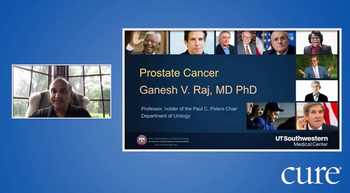
Watch Dr. Ganesh V. Raj, from UT Southwestern Medical Center, discuss surgery for localized disease, during the CURE Educated Patient Prostate Cancer Summit.
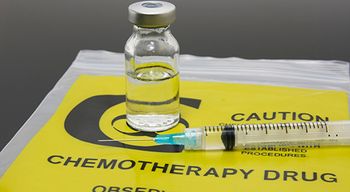
The use of the chemotherapy ifosfamide was associated with small improvements in survival outcomes in a group of patients with relapsed/refractory Ewing sarcoma, a rare type of bone or soft tissue cancer.

The findings of the study show that Enhertu should be a new standard of care for patients with HER2-low metastatic breast cancer, according to an expert at Memorial Sloan Kettering Cancer Center.

Survival outcomes and side effect rates were similar in patients with extensive-stage small cell lung cancer who did and did not have tiragolumab added to their treatment regimen of Tecentriq and chemotherapy.

Despite similar responses to treatment, patients with previously treated non-small cell lung cancer derived a better overall survival benefit from treatment with Keytruda combined with Cyramza than the usage of standard-of-care therapies.

At a follow-up of more than two years, treatment with a novel drug produced meaningful results in a group of patients with HER3-expressing metastatic breast cancer or metastatic triple-negative breast cancer.
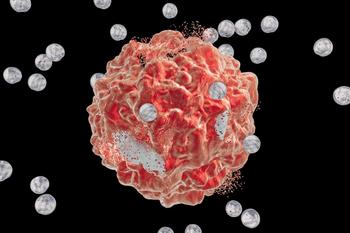
The investigational agent SOT101 was safe and tolerable when given alone and in combination with Keytruda for patients with solid tumors.
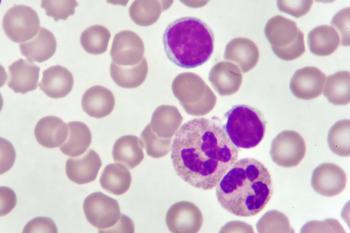
Long-term study results show that outcomes, such as survival and response rates, in patients who have received Calquence-containing treatment regimens continue to outpace outcomes in those who were given Gazyva and chemotherapy.

Treatment with Trodelvy resulted in slight survival improvements, when compared with standard of care chemotherapy regimens, in patients with hormone receptor–positive, HER2-negative metastatic breast cancer.

Adcetris plus doxorubicin, vinblastine and dacarbazine is the first regimen to improve overall survival compared to the current standard of care for patients with advanced-stage classical Hodgkin lymphoma.

Tibsovo plus Vidaza led to survival benefit for patients with IDH1-mutant acute myeloid leukemia, according to findings from the AGILE clinical trial.

While Cabometyx had a favorable side effect profile, it did not lead to a significant survival advantage over placebo in a clinical trial.

Avasopasem manganese is the first drug that has been shown to reduce the incidence and severity of chemotherapy-related oral mucositis in patients with head and neck cancer, research showed.
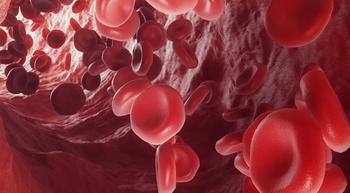
Vonjo proved to have a similar, or superior, side effect profile compared with the best available therapy for patients with myelofibrosis, a form of blood cancer.

Adagrasib demonstrated an 80% disease control rate among patients with previously treated KRAS G12C–mutated non–small cell lung cancer.

Research showed that Hispanic children with neuroblastoma who are participating on clinical trials tended to have worse survival outcomes than others.

Watch Dr. Jamile Shammo and Dr. Srdan Vestovsek answer questions about disease approaches during the CURE Educated Patient MPN Summit.
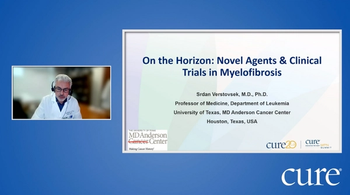
Watch Dr. Srdan Vestovsek, from The University of Texas MD Anderson Cancer Center, discuss novel agents and clinical trials in myelofibrosis, during the CURE Educated Patient MPN Summit.